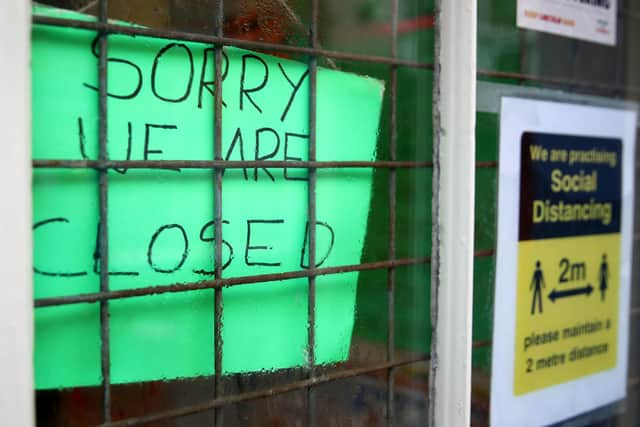UK economy bounces back from January slump but trails pre-pandemic level
The Office for National Statistics (ONS) said UK gross domestic product (GDP) grew by 0.4 per cent, representing an improvement from a 2.2 per cent decline in January, which itself had been revised upwards from a previously predicted 2.9 per cent fall.
Nevertheless, the February reading was slightly below the forecasts of some analysts, with experts at Investec predicting a 0.7 per cent improvement for the month.
Advertisement
Hide AdAdvertisement
Hide AdThe construction sector saw activity jump by 1.6 per cent for the month amid a lift in new work and maintenance.


Production and manufacturing activity also improved, with the two sectors revealing 1 per cent and 1.3 per cent improvements respectively.
Meanwhile, the service sector remained particularly constrained, reporting just 0.2 per cent growth, as hospitality and retail were impacted by pandemic restrictions.
An ONS spokeswoman said: “The economy showed some improvement in February after the large falls seen at the start of the year but remains around 8 per cent below its pre-pandemic level.
“Wholesalers and retailers both saw sales pick up a little, while manufacturing improved with car producers experiencing a partial recovery from a poor January.
“Construction grew strongly after revised figures showed they had struggled in the last couple of months.
“Exports to the EU recovered significantly from their January fall, though still remain below 2020 levels.
“However, imports from the EU are yet to significantly rebound, with a number of issues hampering trade.”
Advertisement
Hide AdAdvertisement
Hide AdDerrick Dunne, chief executive at Beaufort Investment, said: “February’s GDP data shows the enduring impact of the lockdown, covering as it does the period when many shops and services were still shuttered.
“The numbers offer good insight into how successful different sectors have been in adapting to ongoing restrictions, with manufacturing and construction faring particularly well.
“While firms in the consumer-facing services sector continued to struggle, pubs and restaurants being allowed to reopen should give the sector a much-needed boost – though it could take some time for this uplift in spending to really feed through.
“The key data points will come when we get second quarter data through, as that will show more of the true rebound from lockdown.”
Suren Thiru, head of economics at the British Chambers of Commerce, said: “The latest data confirms a modest return to growth in February. However, coming after a contraction in January, it does little to alter the prospect of a downbeat first quarter for the UK economy.
“The pick-up in output in February reflected a broad-based improvement in activity with all the main sectors recording an increase in growth. The clarity provided by February’s announcement of a roadmap for reopening also helped support output in the month.
“The release of pent-up demand following the easing of restrictions and the strong vaccine rollout will boost activity. However, hope of a sustained consumer-led revival may prove too optimistic as the economic scarring caused by Covid may trigger a renewed reluctance to spend as government support winds down.”
A message from the Editor:
Thank you for reading this article. We’re more reliant on your support than ever as the shift in consumer habits brought about by coronavirus impacts our advertisers. If you haven’t already, please consider supporting our trusted, fact-checked journalism by taking out a digital subscription: www.scotsman.com/subscriptions
Comments
Want to join the conversation? Please or to comment on this article.